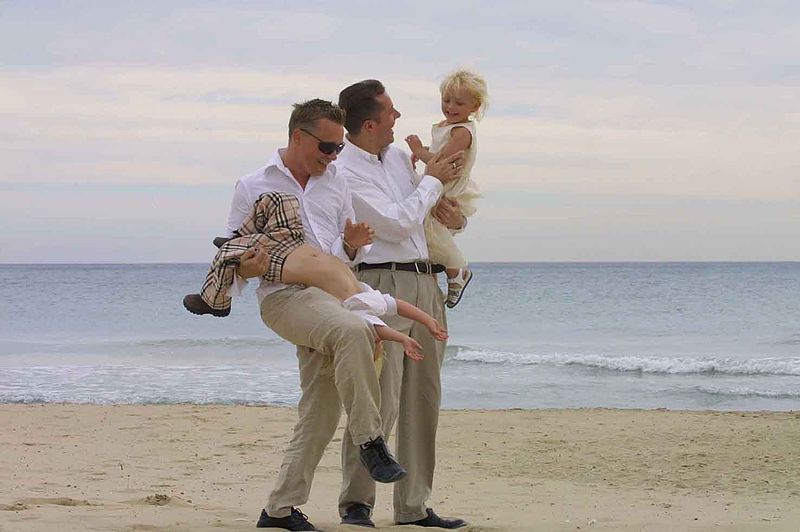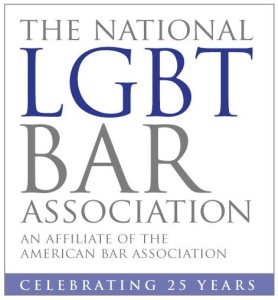Same-Sex Couples, Reunite With Your Loved Ones and Exercise Your New Right to
Become an American Citizen
On June 26, 2015, the Supreme Court of the United States issued its opinion in Obergefell v. Hodges, and, in one ruling, made the LGBT right to marry the law of the land. All states must now issue marriage certificates to all American citizens seeking a life-time union, regardless of their sexual orientation. It is a landmark victory for the LGBT community and its allies that has been hard fought for decades. It is a new day in immigration equality.
When the U.S. Supreme Court overturned the Defense of Marriage Act (DOMA) in the case United States v. Windsor, 133 S.Ct. 2675 (2013), gays, lesbians, bisexuals, and transgender U.S. citizens and legal permanent residents (LPRs) gained their right to petition for green card or citizenship for their same-sex foreign fiancé and spouses. Oliver-Zhang Law has been honored to assisted many same-sex LGBT couples in obtaining green cards for their foreign spouses. Green cards are being issued to same-sex couples across the country, so you can begin the application process right away. Our experience with same-sex immigration is one of continued success since the law first changed in 2013 to sanction same-sex green cards; we understand how to navigate through the unique challenges of same-sex immigration.
In immigration cases, the green card application evidentiary process for same-sex couples could differ significantly from similarly-situated heterosexual couples depending on variations in personal history and social values. Typically, the evidence of a good faith, bona fide marriage required in every marriage green card application would include a couples’ illustrious dating history, or big weddings filled with familial love and acceptance.
How are same-sex couples supposed to produce comparable evidence of a good faith marriage, when many gays and lesbians are still closeted because they fear rejection, discrimination, or even violence? We have clients from countries where their very lives would have been in danger if they were outed. Thus, staying invisible is key to their survival and way of life. The reality is that the societal standards applied for assessing what a “real marriage” looks like remains skewed by traditional assumptions. Moreover, many same-sex green card applicants are nervous about being judged based upon their sexual identity, rather than the strength of their spousal relationship.
To combat these specialized issues, our same-sex immigration attorneys focus on obtaining the highest-level of evidence and detailed proof necessary to help the LGBT community truly achieve equal and fair results in their applications for green cards, asylum, visas, and other immigration benefits.
While Obergefell is a historical case in the right direction, we understand the heavy burden in same-sex, LGBT immigration. An experienced same-sex immigration attorney can still help you navigate the intricacies of your case.
Contact us for a free-consultation with an experienced immigration attorney focused on LGBT green card and family-immigration issues today. See what our prior clients have to say regarding our services.
Some questions that you might ask are:
- What does this mean if my fiancé lives abroad?
- What does this mean if my fiancé is living illegally in the United States?
- What does the new immigration benefit mean for my foreign fiancé or spouse’s immediate family?
- What if my foreign spouse is a victim of domestic violence?

What does this mean if my fiancé lives abroad?
This means that you can sponsor your same-sex fiancé through the K-1 fiancé visa process if he or she is currently living abroad. You can now get married in any state within 90 days of your fiancé’s arrival into the United States. After you are legally married, you can sponsor your fiancé for a green card.
You can also marry your fiancé in a country that recognizes same-sex marriage and apply for a spousal green card directly through consular processing. There are only 20 countries that recognize same-sex marriage. LGBT immigrants come to the United States to avail themselves to the protection of our civil liberties. Countries that have some or complete legalization of same-sex marriage: The Netherlands (2001), Belgium (2003), Spain (2005), Canada (2005), South Africa (2006), Norway (2009), Sweden (2009), Portugal (2010), Iceland (2010), Argentina (2010), Denmark (2012), Brazil (2013), France (2013), Uruguay (2013), New Zealand (2013), United Kingdom [England, Wales, Scotland] (2013), Luxembourg (2014), Finland (2014), Ireland (2015), United States (2015).
LGBT immigrants come to the United States to avail themselves to the protection of our civil liberties, but if your fiancé is abroad, entering into the country on the right type of visa can also be extremely important to the later green card process. If you intend to come to the United States to get married, please call us for a free consultation before you do so in order avoid violating immigration laws that could damage your eligibility for a green card later in the process.
If your same-sex fiancé has children under the age of 18, they can also qualify for a green card.
The K-1 visa and subsequent I-130 green card applications can be complicated, as you must show the US government that the marriage was not a sham by providing sufficient evidence that you have a “bona fide” relationship and that you have the good faith intent to marry within 90 days of your fiancé’s arrival into the United States. You will also need to show documentation that you have the ability to financially support your spouse.
What does this mean if my fiancé is living illegally in the United States?
Typically, once the U.S. Citizen or lawful permanent resident marries the same-sex foreign national fiancé, the foreign spouse is eligible to receive their green card from within the United States. They can adjust their status to permanent resident so long as they entered the United States through a valid port of entry following inspection by a U.S. official.
For undocumented individuals who entered the U.S. illegally, or without inspection (“EWI”), receiving a green card is far more complicated if you have been unlawfully present in the country for more than 180 days. If you have stayed in the U.S. without legal status for more than 180 days, it triggers a 3-year bar from re-entering the United States once to exit the country. If you have been unlawfully present in the U.S. for more than one-year, you will be barred for 10-years. If the unlawful presence 3-year or 10-year bar is an issue for you, the foreign spouse must be able to qualify for a “waiver of inadmissibility”, or I-601 waiver, in order to stay in the country. Amongst other requirements, the waiver demands proof that the departure of the foreign spouse will create “extreme hardship” to the U.S. citizen spouse if he or she was barred from the United States for 3 or 10 years. We can assist by giving you the information you need and the legal know-how to navigate towards securing a green card for same-sex foreign spouses and their families in complex situations.
Immigration laws still present significant obstacles that would require the gay alien spouse threatened with removal from this country to submit an I-601 or I-601A waiver. Essentially, in order to cure their inadmissibility and ineligibility for a green card, this waiver must overcome the high bar that their U.S. citizen spouse would experience “extreme hardship” if the couple were forced to separate.
What does the new immigration benefit mean for my foreign fiancé or spouse’s immediate family?
LGBT U.S. citizens and legal permanent residents can now sponsor their spouses’ children for green card. Once the foreign spouse receives legal status, he is also then entitled to sponsor his married children, grandchildren, parents, and siblings to immigrate to the United States and receive legal status.
In other words, the new federal immigration benefits also confer the right to green card to the foreign spouse’s children, parents, and siblings as well as the siblings’ spouses and minor children in the United States.
Don’t wait. The gay, lesbians, bisexual, transgender community has already waited long enough. We fought hard for these rights and it is now time to both create and be reunited with our families. The visa process can take from six-months to over a year, but expediting is possible. By learning about the specifics of your case, we can give you a free consultation about how to apply for a green card or U.S. citizenship for your loved ones and alert you to any potential problems that may cause delays or denials of your application.
- What if my foreign spouse is a victim of domestic violence?
Foreign LGBT spouses of U.S. citizens or LPRs who are victims of domestic violence are now also eligible to break free of the cycle of abuse by filing a self-petition to obtain their green card independent of the abuser under the provisions of Violence Against Women Act (male victims are also absolutely eligible). This means LGBT survivors of domestic abuse and their children, so long as they were married to a U.S. citizen or LPR, can leave the abuser and still qualify for permanent residency under VAWA even if they were without legal status during the marriage.
Same-sex, non-citizen spouses of gay, lesbian, bisexual, and transgender U.S. citizens or LPRs are now eligible for family-based immigration benefits as follows:
- K-1 Fiancé Visas (Except for LPRs)
- K-3 Marriage Visas
- Form I-130, Petition for Alien Relative for foreign spouse, parents of foreign spouse, siblings of foreign spouse, and children of foreign spouse.
- Adjustment of Status to obtain a Green Card
- Immigrant Visas obtained through consular processing
- Waivers based on a qualifying US citizen or LPR Spouse
- VAWA Domestic Violence Victim Permanent Residence Self-Petition
- Derivative spouse or immigrant visas from refugee or asylum status
Same-sex, non-citizen spouses of gay, lesbian, bisexual, and transgender U.S. citizens or LPRs who are in danger of deportation in removal proceedings can now apply for certain relief to stay in America:
- Cancellation of removal
- Adjustment of Status in proceedings
- I-212(h) waiver
Same-sex spouses of gay, lesbian, bisexual, and transgender foreign nationals who received employment-based visas can now come along to the United States through derivative visa benefits:
- H-4 visa for a spouse who holds an H-1B Specialty Occupation visa
- L-2 visa for a spouse who holds an L-1 Intracompany Transferee visa
- E-2 visa for a spouse who holds an E-2 treaty trader or treaty investor visa
- R-1 visa to accompany the spouse of a religious visa holder
- Green-card eligibility for spouses of EB-5 investors
Oliver-Zhang Law is a proud member of National LGBT Bar Association.
 The National LGBT Bar Association[/caption]
The National LGBT Bar Association[/caption]







